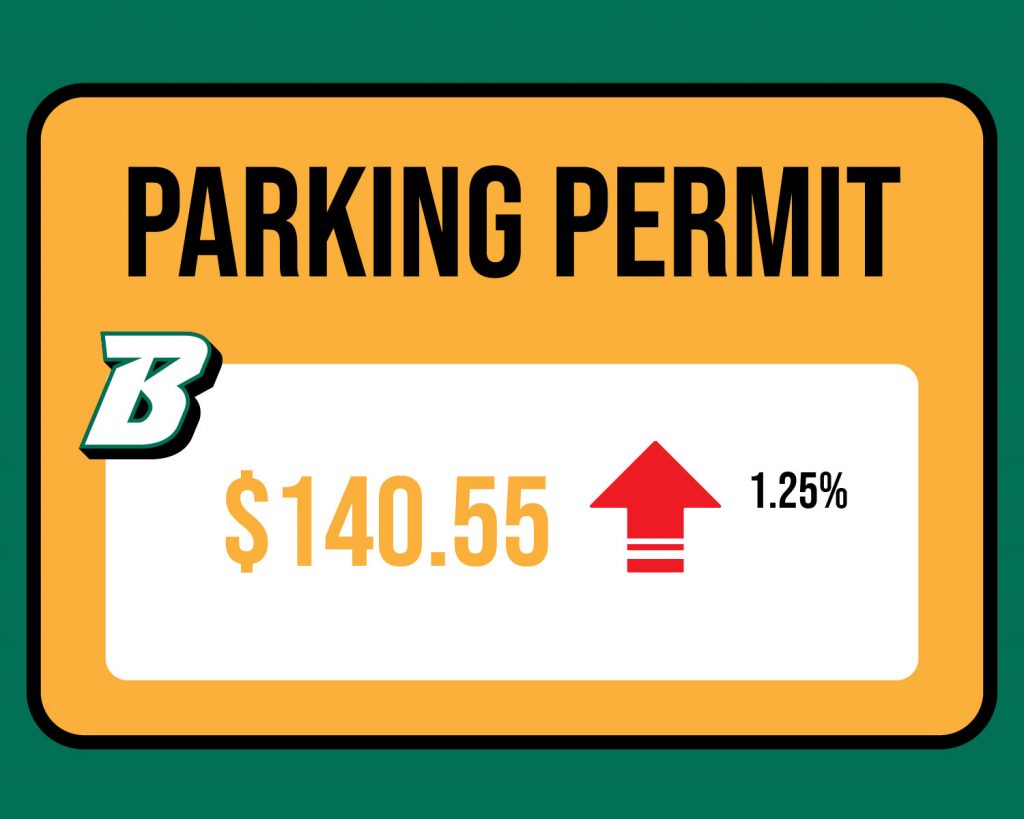In response to an approximately $2 million deficit, on-campus parking permit prices are set to increase annually starting next fall.
As discussed in a Binghamton University Council meeting on April 21, the deficit is a result of parking rates remaining consistent for over a decade. The failure to increase the parking permit price with the gradually increasing maintenance costs has also prevented the University’s parking lots from being fully kept, administrators said. Student parking permits, which are available as both annual commuter passes and annual resident passes, have remained at $140.55 since 2011. Meanwhile, meter rates, which cost $1.00 per hour, have not been adjusted since 2013.
A rate increase of 1.25 percent per year has now been established, after a proposed schedule of parking price increases was created and received approval from the Parking and Transportation Stakeholders Group (PTSG), an organization with representation from various BU community members.
Parking permit prices are set to begin increasing in fall 2023, and will continue for the next couple of years. Janice Bennett, the senior executive director for student affairs administration, explained what the increase will entail for students in the upcoming years.
“Permit fees have not been increased since 2011 and meters since 2013, while costs have gone up significantly over that same time,” Bennett wrote in an email. “The most common permit used by students will increase by less than $20 annually and changes were reviewed and supported by the [PTSG], which includes a wide representation of students, faculty and staff.”
Brian Rose, the vice president of student affairs, proposed the finalized parking permit increase at the Council meeting, which was supported by a majority vote from the Council members. Rose explained that the money obtained from the initiative will allow the University to invest in parking lot maintenance, including keeping the lots clean, safe and accessible to students, faculty, staff and visitors.
“The parking operation, if you will, functions as an auxiliary service, meaning the revenues we take in are being used to support the operations of the parking enterprise,” Rose said. “We have a substantial deficit, roughly $2 million now, of parking lot maintenance because the revenues we take in are not sufficient to do all the work that should be done with respect to keeping the parking lots prepared and painted.”
Students expressed frustration toward the price increase, claiming parking prices should be covered by tuition and other mandatory fees that students are expected to pay.
Gabrielle Camillery, a senior majoring in biology, was opposed to the price increase as a commuter student.
“Parking passes are already pretty expensive for the limited amount of available parking during the day,” Camillery said. “They should find a way to integrate that upgraded charge into our tuition and fees which are already super expensive as well.”
Alicia Baj, a sophomore majoring in integrative neuroscience, described the parking prices as being “too expensive” already and claimed she does not drive due to fear of unexpected rate increases. Additionally, Baj noted that there is a need for increased parking availability on campus.
“Honestly, the increase surprises me, but it upsets me even more,” Baj said. “This is why I take the bus instead of driving, because the prices for things that should be included in our tuition fees, like parking, are charged separately. There aren’t even enough parking spaces to begin with, so I hope some of the extra funds go toward expanding parking or adding additional lots, maybe a parking garage for students with passes.”



